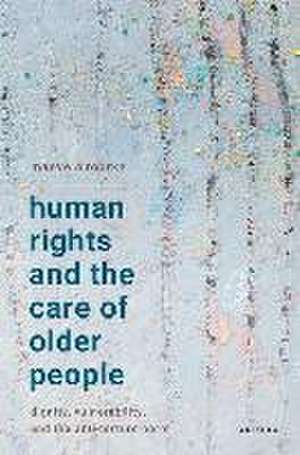Human Rights and the Care of Older People: Dignity, Vulnerability, and the Anti-Torture Norm
Autor Maeve O’Rourkeen Limba Engleză Hardback – 20 mai 2024
Preț: 677.49 lei
Preț vechi: 836.41 lei
-19% Nou
Puncte Express: 1016
Preț estimativ în valută:
129.64€ • 138.63$ • 108.09£
129.64€ • 138.63$ • 108.09£
Carte disponibilă
Livrare economică 27 martie-10 aprilie
Preluare comenzi: 021 569.72.76
Specificații
ISBN-13: 9780192859716
ISBN-10: 0192859714
Pagini: 272
Dimensiuni: 160 x 240 x 22 mm
Greutate: 0.59 kg
Editura: OUP OXFORD
Colecția OUP Oxford
Locul publicării:Oxford, United Kingdom
ISBN-10: 0192859714
Pagini: 272
Dimensiuni: 160 x 240 x 22 mm
Greutate: 0.59 kg
Editura: OUP OXFORD
Colecția OUP Oxford
Locul publicării:Oxford, United Kingdom
Recenzii
In this timely and important book, Maeve O’Rourke eloquently and thoroughly confronts abuses and failings within the care of older persons with a focus on the imperative of dignity. In doing so, she offers vital insights on the always 'unfinished business' of the progressive interpretation of the right against torture and ill-treatment. This is an invaluable resource for human rights scholars and advocates alike.
Through the lens of human rights law and its prohibition against torture and ill-treatment, Dr. O'Rourke offers an eye-opening, mind-bending analysis of the state's obligations to the care of older people, whose dignity and rights are at risk every day. In this carefully researched, clear presentation, Dr. O'Rourke explores the jurisprudence of regional and international courts to clarify the vulnerability that stems from the powerlessness of older persons in care facilities and to identify what constitutes ill-treatment that amounts to a violation of international norms. Her book offers a new and important assessment of standards for consent and care, arguing that states must prevent 'dignity violations.' Published at the very moment when the international community is examining the prospect of a new treaty ensuring the rights of older persons, this authoritative account couldn't be more timely.
O'Rourke's work invites serious reflection that those drafting a Convention and those subsequently invoking (advocates) and interpreting (adjudicators) ought to draw upon.
Through the lens of human rights law and its prohibition against torture and ill-treatment, Dr. O'Rourke offers an eye-opening, mind-bending analysis of the state's obligations to the care of older people, whose dignity and rights are at risk every day. In this carefully researched, clear presentation, Dr. O'Rourke explores the jurisprudence of regional and international courts to clarify the vulnerability that stems from the powerlessness of older persons in care facilities and to identify what constitutes ill-treatment that amounts to a violation of international norms. Her book offers a new and important assessment of standards for consent and care, arguing that states must prevent 'dignity violations.' Published at the very moment when the international community is examining the prospect of a new treaty ensuring the rights of older persons, this authoritative account couldn't be more timely.
O'Rourke's work invites serious reflection that those drafting a Convention and those subsequently invoking (advocates) and interpreting (adjudicators) ought to draw upon.
Notă biografică
Maeve O’Rourke, PhD (Birmingham), LLM (Harvard), BCL (University College Dublin), is Assistant Professor of Human Rights at the Irish Centre for Human Rights, University of Galway, Ireland. She is also a Barrister at 33 Bedford Row, London. She is a member of the Young Academy Ireland, a former Harvard Law School Global Human Rights Fellow, and a former recipient of the UK Family Law Pro Bono Lawyer of the Year award for her research and advocacy alongside survivors of Ireland's twentieth century church/state and family separation abuses. She has authored and edited numerous publications on state responsibility for protecting human rights in the social care context. She directs the Human Rights Law Clinic at the Irish Centre for Human Rights.
